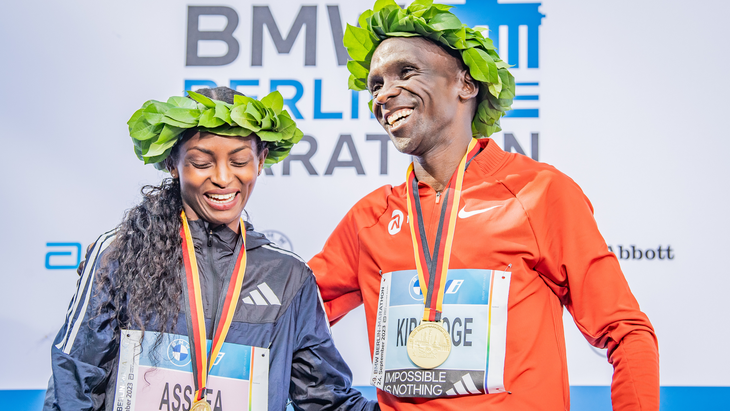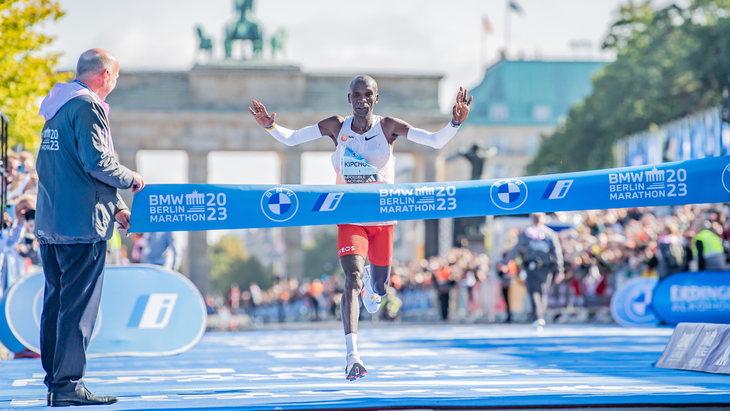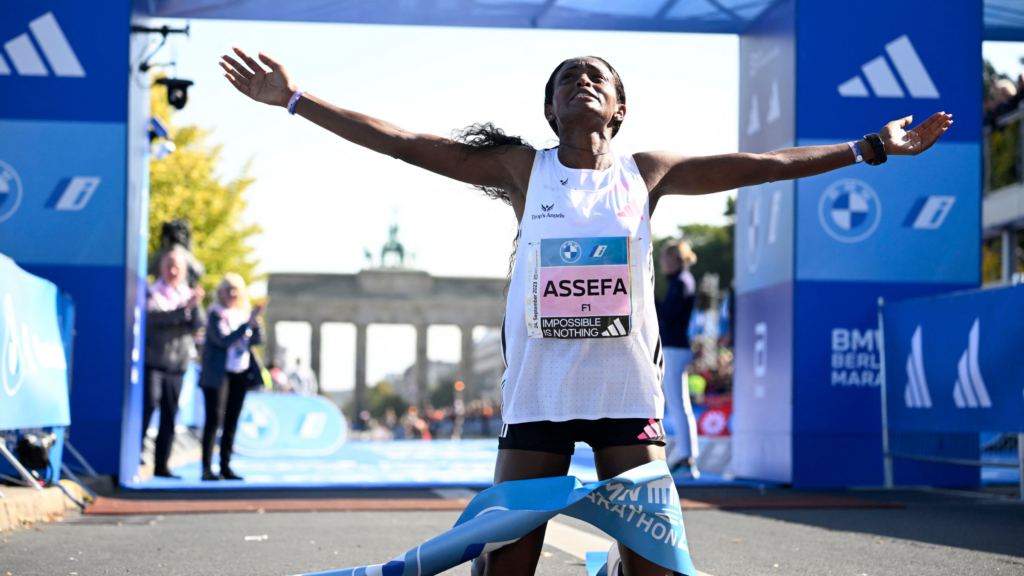No products in the cart.
Outdoor Adventure
Tigst Assefa Shatters Women’s Marathon World Record in Berlin
Heading out the door? Read this article on the new Outside+ app available now on iOS devices for members!
Download the app.
Ethiopia’s Tigst Assefa smashed the women’s world record in the marathon on Sunday, defending her Berlin Marathon title with an astonishing 2:11:53 effort.
Aided by a fast pack of women competitors early in the race and her male pacemaker Azmera Gebru, Assefa averaged 5:02 per mile wearing a pair of Adidas’ new Evo 1 racing shoes and took more than two minutes off the previous women’s world record of 2:14:04, which had been set by Kenya’s Brigid Kosgei at the 2019 Chicago Marathon.
From the Track to Marathon World Record Holder
Assefa, 29, was a 2016 Olympian in the 800-meter run, but she only began running marathons about two years ago. She entered the Berlin Marathon last year with a very modest personal best of 2:34:01, but surprised everyone with her 2:15:37 course-record victory in the third-fastest time ever.
This year, she and compatriot Workenesh Edesa set a blistering early pace, but they weren’t alone as they went through the 5K mark in 15:58 and the 10K in 31:45. Through the first nine miles, 12 women were within 15 seconds of one another—and all were running inside world record pace.
Assefa and Edesa had managed to open up a slight gap on Kenya’s Sheila Chepkirui and Ethiopia’s Senbere Teferi and Zeineba Yimer, but by the time Assefa reached the halfway mark in 1:06:20 she was all alone. From there, she ran stride for stride with Gebru before eventually running solo to the finish, easily securing the win over Kenya’s Sheila Chepkirui (2:17:49). Tanzania’s Magdalena Shauri, making her marathon debut, finished third in 2:18:41.
The top eight women finished under 2:20, making it the fastest women’s marathon in history.
Americans Annie Frisbie (2:27:02) and Jacqueline Gaughan (2:27:08) finished 17th and 18th, respectively, while Jane Bareikis was 21st (2:29:00).
RELATED: 10 Things To Know About the Berlin Marathon

Kipchoge Wins Again
Marathon legend Eliud Kipchoge didn’t break his own world record (2:01:09) that he set last year, but the 38-year-old Kenyan added to his Berlin legacy with a record fifth victory in 2:02:42, the fifth-fastest time of his illustrious career.
The two-time Olympic champion, who wore a pair of new Nike Alphafly 3 supershoes, averaged 4:41 per mile and won by 31 seconds, but for most of the race he had company in the unheralded Derseh Kindie of Ethiopia.
Kipchoge and Kindie separated from the lead pack early in the race, reaching the 5K mark in 14:12. They continued their fast, frontrunning pace and reached the 10K point in 28:27, which put them exactly on 2:00:00 marathon pace and 30 seconds ahead of the seven-man chase pack.
They continued to run together at world record pace through the halfway point (1:00:22), but they slowed shortly thereafter. Kipchoge finally broke away from Kindie after the 19-mile mark and ran strong at the front all the way to the finish. He won by 31 seconds over fast-finishing Vincent Kipkemoi of Kenaya (2:03:13). Ethiopia’s Tadese Takele was third in 2:03:24.
Although Kindie dropped out before the finish, the top nine men broke 2:04 and the top 15 were faster than 2:06, making it one of the fastest men’s marathons in history.
Teshome Mekonen, an Ethiopian-born New York City-based runner who received U.S. citizenship in 2022, placed 24th in 2:10:16. Jared Ward, a 2016 U.S. Olympian from Utah, was 27th in 2:11:44, while fellow American Tyler Pennel was 29th in 2:14:28.
Jake Riley, who ran in the Tokyo Olympic marathon three years ago for the U.S., finished 54th in 2:18:18 in his first marathon since undergoing double Achilles surgery in 2022 to correct Haglund’s syndrome.

RELATED: Kipchoge’s Greatest Competition in the Berlin Marathon? Himself.
Source link

